|
|
|
Sort Order |
|
|
|
Items / Page
|
|
|
|
|
|
|
| Srl | Item |
| 1 |
ID:
138518


|
|
|
| 2 |
ID:
059973
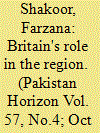

|
|
|
| 3 |
ID:
104252
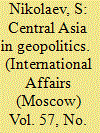

|
|
|
|
|
| Publication |
2011.
|
| Summary/Abstract |
CENTRAL ASIA has a rich history. At one time, it boasted the Great Silk Road, a major trade route between Europe and China. It was also an arena where Chinese, Mongolian, Persian, Turkish, and Arabian military commanders led their armies in brutal battles, prosperous towns were built and destroyed, and huge empires appeared and disappeared. So researchers have examined this region in the most diverse geographical configurations.
After the collapse of the Soviet Union, Central Asia became an independent geopolitical entity comprised of Kazakhstan, Kyrgyzstan, Tajikistan, Turkmenistan, and Uzbekistan. This concept became firmly ensconced in Russia (although during Soviet times, the region was defined as the Central Asian republics and Kazakhstan) and is adhered to by most experts in the West and the East. The OSCE also understands Central Asia as precisely these five former Soviet republics. There are also such projects as the "EU and Central Asia: Strategy for a New Partnership" and the "Central Asia plus Japan" which are aimed at developing relations with the region's states.
|
|
|
|
|
|
|
|
|
|
|
|
|
|
|
|
| 4 |
ID:
146895
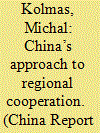

|
|
|
|
|
| Summary/Abstract |
China’s rise has inspired a variety of interpretations arguing for either its potentially disruptive or alternatively its benign impact on Asia–Pacific security. This article aims to contribute to this debate. It focuses on the upsurge in Beijing’s multilateral diplomacy since the beginning of the 1990s, which has been reflected in China’s willingness to take part in many regional institutions, such as Shanghai Cooperation Organization (SCO), the Six Party Talks (6PT), East Asia Summit (EAS) or Asia Pacific Economic Cooperation (APEC). But what are China’s motivations for participation in these institutions? Are they instrumental, driven by pragmatic self-interest, or moral, driven by normative values of peace? Or, has China merely accepted the need to play a socially ‘appropriate’ role within the region? The article offers a theoretically informed typology of the different kinds of motivation that can explain China’s multilateral diplomacy in the last three decades. It argues that whereas social motivation played a decisive part in the first phase of China’s multilateralism, instrumental motivation can be seen as defining the more recent phase.
|
|
|
|
|
|
|
|
|
|
|
|
|
|
|
|
| 5 |
ID:
142514
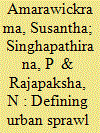

|
|
|
|
|
| Summary/Abstract |
Many scholars agree that there is no clear consensus regarding what “urban sprawl” is or what causes it. The term “sprawl” can be used or defined a number of ways for many situations. When its definition is ambiguous, it is impossible to determine its causes or consequences, including the effects of any policies designed to contain it. In this paper, first, we provide a conceptual definition of urban sprawl based on different dimensions such as density, concentration, proximity to services, automobile dependency, and extent of vegetation cover being paddy, eco-sensitive, or with decreased plantation areas. Such a definition provides a basis for understanding urban sprawl, its nature and its characteristics being location and context specific. Second, an “extended urban area” is demarcated as the geographical base for the study of the urban sprawl. Each dimension is defined and tested in 25 urbanized and suburbanized areas in the Colombo Metropolitan.
|
|
|
|
|
|
|
|
|
|
|
|
|
|
|
|
| 6 |
ID:
185977


|
|
|
|
|
| Summary/Abstract |
The literature on South Korean elections has shown that voters’ region, ideology, and generation shape their preferences at the polls. Few studies, however, have investigated the long-term effects of these variables or the difference in the effects of ideology and generation between regions. In this article, we generate theoretical expectations of Korean voters’ voting behavior, analyzing cleavage structures in the party system since democratization, and we then examine the interactive effects of region with ideology and generation across voters from Gyeongsang and Jeolla, in six presidential elections from 1992 to 2017. We find that ideology and generation have stronger effects among Gyeongsang voters than among Jeolla voters. To be specific, ideology and generation often divide Gyeongsang voters, especially when the Democratic Party nominates a presidential candidate from Gyeongsang; Jeolla voters are more homogeneous in their support for the party, regardless of their ideology and generation.
|
|
|
|
|
|
|
|
|
|
|
|
|
|
|
|
| 7 |
ID:
152823
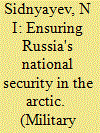

|
|
|
|
|
| Summary/Abstract |
This paper covers issues of Russia's national security in the Arctic as viewed from the military perspective. It examines the trends in the development of a reliable defense system for this country. It postulates the importance of greater defense capacity in the Russian Arctic, as NATO relentlessly builds up its military forces next to Russian borders, and the US military infrastructure continues to develop.
|
|
|
|
|
|
|
|
|
|
|
|
|
|
|
|
| 8 |
ID:
180725
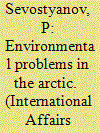

|
|
|
|
|
| Summary/Abstract |
THE FIRST mentions of the Arctic date back to the 4th century BC, during the development of sea navigation.1 The origins of the word "Arctic" stem from the Greek "ἀρκτικός" (pronounced "arktikos" and meaning "northern") and άρκτος ("bear," associated with the constellation Ursa Major). It refers to the lands located under this constellation. This physical and geographical region of the Earth, with climatic conditions that make it difficult to sustain life, is an integral part of the surface of the globe. Adjacent to the North Pole, it encompasses the circumpolar expanse whose inner radius includes the seas of the Arctic Ocean, its islands and archipelagos, as well as coastal territories of the surrounding three continents: Europe, Asia and North America.
|
|
|
|
|
|
|
|
|
|
|
|
|
|
|
|
| 9 |
ID:
087784
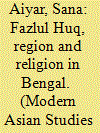

|
|
|
|
|
| Publication |
2008.
|
| Summary/Abstract |
In the wake of the Government of India Act of 1935, provincial politics emerged as a challenge to the authority and legitimacy of all-India, centralised political parties. While the Congress and the Muslim League set up a binary opposition between secular and religious nationalism, provincial politicians refused to succumb to the singularity of either alternative. Partition historiography has been concerned with the interplay of national and communal ideologies in the 1940s, overshadowing this third trajectory of regional politics that was informed by provincial particularities. This article traces a short-lived alternative that emerged in Bengal between 1940 and 1943 under the premiership of Fazlul Huq. Huq produced a peculiar form of identity politics that appealed not only to religious sentiment but also to regional loyalty that cut across the religious divide. Significantly, he did so without resorting to secular claims. By challenging Jinnah's claim to being the sole spokesman of Muslims in India and highlighting the different concerns of a province with a Muslim majority, Huq reconciled the twin identities of religion and region within the same political paradigm, and foreshadowed the emergence of Bangladesh in 1971.
|
|
|
|
|
|
|
|
|
|
|
|
|
|
|
|
| 10 |
ID:
195075


|
|
|
|
|
| Summary/Abstract |
In the Xi Jinping era, China is actively implementing the Belt and Road Initiative (BRI) around the globe. Under the BRI, infrastructure development has become the main agenda for China to create connectivity. One of the infrastructure projects in the energy sector is the Nam Ou Cascade Hydropower Project. The Nam Ou River is a tributary of the Mekong River located in Laos and borders China. For Laos, this project is part of their vision to be “The battery of Southeast Asia.” Therefore, this article attempts to explain that Nam Ou Hydropower has implications for China’s dominance in the Mekong region. The circle hydro-hegemony is used as the conceptual framework for analyzing the phenomenon. This article also applies a qualitative method with secondary data. The article shows that the Nam Ou Cascade Hydropower Project in Laos elevates China’s influence in the Mekong region. By actively pulling and pushing its neighbors into cooperation, China exercises its power as an upstream country.
|
|
|
|
|
|
|
|
|
|
|
|
|
|
|
|
| 11 |
ID:
084473
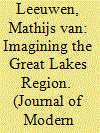

|
|
|
|
|
| Publication |
2008.
|
| Summary/Abstract |
The idea has gained ground in recent years that, as conflicts in the countries of the Great Lakes Region are strongly interlinked, regional approaches are necessary to resolve them. This interest in regional dimensions of conflict and peacebuilding also gains currency in other parts of the world. Attention to regional approaches is reflected in the efforts of international organisations and donors to promote civil society peacebuilding. They assume that regional cooperation and exchange between civil society organisations contribute to peace, and provide an alternative to single-country interventions or regional diplomatic initiatives. This paper explores how such assumptions work out in practice. Experiences in the Great Lakes Region show that local and international organisations have difficulty in analysing the regional character of conflict and arriving at collaborative regional strategies. Moreover, local civil society organisations are deeply embedded in the politics of regional conflict. Consequently, the shift to regional peacebuilding approaches remains more theoretical than practical. This paper suggests that international supporting organisations need to adjust their ambitions in regional peacebuilding, but nonetheless have roles in fostering regional identification among civil society organisations.
|
|
|
|
|
|
|
|
|
|
|
|
|
|
|
|
| 12 |
ID:
176231
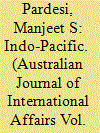

|
|
|
|
|
| Summary/Abstract |
The term ‘Indo-Pacific’ has now entered the strategic lexicon to refer to strategic Asia. In contrast to the dominant themes in the scholarly literature that emphasise its ‘newness’ and conceive it as a maritime space, I argue that Asia's three sub-regions (South, Southeast, and Northeast Asia) and two oceans (Indian and Western Pacific) have constituted a single strategic system for the past two centuries (with the notable exception of the last three decades of the Cold War). Importantly, future regional order in this ‘larger Asia’ will emerge from the interdependence of continental and maritime power. Approaching International Relations as an historical social science, I construct a new historical narrative to explain region (trans)formation. This larger strategic Asia that first emerged around the time of the ‘great divergence’ between the West and the rest was created by a rising Britain through its Indian base. While Cold War geopolitics ‘split’ Asia into smaller sub-regions, the rise of China and India is reversing this split. The contemporary re-emergence of the Indo-Pacific allows the United States to create a regional distribution of power and a regional distribution of status (through discourse) that favours the United States in an increasingly multipolar region.
|
|
|
|
|
|
|
|
|
|
|
|
|
|
|
|
| 13 |
ID:
157311
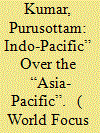

|
|
|
|
|
| Summary/Abstract |
During US president Donald Trump’s recent trip to Asia, he repeatedly used the term ‘Indo-Pacific’, instead of using ‘Asia-Pacific’, to denote the Asian region. It gave a sudden boost to the use of the term in the annals of the White House and, unsurprisingly, irked China.
|
|
|
|
|
|
|
|
|
|
|
|
|
|
|
|
| 14 |
ID:
183974
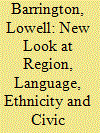

|
|
|
|
|
| Summary/Abstract |
Analysing a unique set of survey data, this study re-examines the impact of regional divides, language, ethnicity and other demographic factors on important political attitudes in Ukraine. It also looks deeper into the issue of language, including an examination of both closed-ended and open-ended responses addressing how and why some residents of Ukraine see the language they speak as part of their identity. Finally, it provides evidence of Ukrainians’ attachment to a citizenship-based civic national identity and examines the connection between this civic identity and both language and ethnic identity in Ukraine. The results carry important implications for Ukraine’s ongoing civic nation-building efforts.
|
|
|
|
|
|
|
|
|
|
|
|
|
|
|
|
| 15 |
ID:
103685
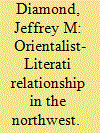

|
|
|
|
|
| Publication |
2011.
|
| Summary/Abstract |
Lahore emerged as a new intellectual centre in northwest India for British Orientalists and Indian intellectuals after the destruction of Delhi during the Great Revolt of 1857. Two prominent individuals who moved to Lahore at this time were Gottlieb Leitner, a philologist and Orientalist scholar, and Maulana Muhammad Hussain Azad, an Urdu poet, literary critic and teacher. Leitner, a naturalised British citizen who studied in Istanbul and completed higher education in Arabic and Turkish in London, became principal of the new Government College in Lahore in 1864. In this position, he exercised a deep influence on education in the northwest by promoting the development and study of vernacular (Urdu language) education, founding and leading a major scientific and literary organisation, the Anjuman-e Punjab. Having aroused strong British opposition, both to his ideas and his combative personality, Leitner's support and assistance from the local literati allowed him to develop and implement his ideas. Leitner's most significant partner was Muhammad Hussain Azad, also a new arrival to Lahore after fleeing Delhi in 1857. Leitner and Azad worked together in the Anjuman-e Punjab to promote their literary and social concerns. They became advocates of neo-Orientalist educational reforms through their public speeches and writing, including works in Urdu intended for, among others, the education of Maulvis. The bracketing of these European and Indian partners is conceptualised in this article through their roles as members of their respective communities as well as outsiders to these very communities. The analysis shows how their complex identities helped them to become highly influential figures in the new cultural environment of post-1857 Lahore.
|
|
|
|
|
|
|
|
|
|
|
|
|
|
|
|
| 16 |
ID:
193044
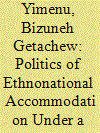

|
|
|
|
|
| Summary/Abstract |
Ethiopia is the most prominent example of the late 20th-century adoption of federalism to accommodate diversity and complete state-building. This article explores the implementation of federalism and accommodation of ethnonational diversity in dominant party regimes by using Ethiopia as a case. Drawing on legal documents, literature, news sources and government reports, the article argues that federalism enabled distinctive groups to promote their culture, use their languages and exercise self-rule in their territory. However, ethnonationalities’ constitutionally proclaimed self-determination rights and the practice rarely correspond. Although all ethnonationalities have the same constitutional rights, some are still subjugated, and self-rule remains their dream. The dominant party regime in Ethiopia met demands for self-rule and accommodation with suppression and violence. The constitution grants regions to use their legislative powers to accommodate region-specific demands; nevertheless, regions cannot operate out of the narrow framework of the federal ruling party. Thus, regions became repressive agents of the centre rather than genuine self-rule agents. Insights from Ethiopia have broader implications for states embracing federalism.
|
|
|
|
|
|
|
|
|
|
|
|
|
|
|
|
| 17 |
ID:
108981
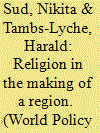

|
|
|
| 18 |
ID:
109000
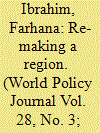

|
|
|
|
|
| Publication |
2011.
|
| Summary/Abstract |
Ethnographic research conducted among the semi-nomadic Muslim Jatts, who inhabit the interstices of the contemporary State both discursively as well as physically, helps us to critically interrogate the formulation of region as articulated both by the modern nation-state as well as contemporary religious ideology. In the official discourse of Gujarat State, the Jatts are represented as threats to the territorial integrity of the nation-state in general and to Gujarat in particular, their cross-border movements into Pakistan designed to destabilise the region. An ethnographic analysis of the state shows how state ideologies are produced discursively over time. This paper argues that travel and trade links in this region have produced historically-blurred boundaries between region, religion and now nation. These histories productively re-configure the current geopolitical iteration of space and belonging in contemporary Gujarat as enunciated by the state.
|
|
|
|
|
|
|
|
|
|
|
|
|
|
|
|
| 19 |
ID:
087934
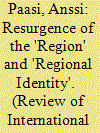

|
|
|
|
|
| Publication |
2009.
|
| Summary/Abstract |
'New regionalism', 'region', 'city-region', 'cross-border region', 'border' and 'identity' have become important catchphrases on the global geo-economic and geopolitical scene. The resurgence of these terms has been part of the transformation of both political economy and governance at supra-state, state and sub-state scales. Regions have been particularly significant in the EU where both the making of the Union itself and the 'Europe of regions' are concrete manifestations of the re-scaling of state spaces and the assignment of new meanings to territory. Such re-scaling has also led to increased competition between regions; a tendency that results from both the neo-liberalisation of the global economy and from a regionalist response. Regional identity, an idea at least implicitly indicating some cohesiveness or social integration in a region, has become a major buzzword. It has been particularly identified in the EU's cohesion policy as an important element for regional development. In spite of their increasing importance in social life and academic debates, regions, borders and identities are often studied separately, but this paper aims at theorising and illustrating their meanings in an integrated conceptual framework and uses the sub-state regions in Europe, and particularly in Finland, as concrete examples. Regions are conceptualised here as processes that gain their boundaries, symbolisms and institutions in the process of institutionalisation. Through this process a region becomes established, gains its status in the broader regional structure and may become a significant unit for regional identification or for a purported regional identity. This process is based on a division of labour, which accentuates the power of regional elites in the institutionalisation processes.
|
|
|
|
|
|
|
|
|
|
|
|
|
|
|
|
| 20 |
ID:
176833
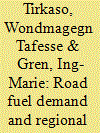

|
|
|
|
|
| Summary/Abstract |
This study estimated national and regional-level gasoline and diesel demand elasticities in Sweden using county-level panel data from 2001 to 2018. The estimated elasticities were used to calculate county cost effect of the Swedish CO2 emission reduction policy in the transport sector. The national-level elasticities were estimated by employing general method of moments (GMM) estimators, while county-level elasticities were calculated by considering the weight of each fuel type share at county and national levels. Own prices, per capita income, and per capita vehicle stocks were statistically significant at national level in determining gasoline and diesel demand. The calculated regional price elasticities showed variation between counties, with the highest being almost 4 times higher than the lowest in absolute terms. A simulation of fuel taxes to achieve the Swedish 2030 emission target for the transport sector under the national and regional price elasticities indicated minor differences at the national level with respect to CO2 taxes, costs and regressivity in the taxes. The results showed considerable differences at the regional level where costs and carbon tax payments can be considerably higher for some counties with the use of national price elasticities and the opposite is the case for other counties.
|
|
|
|
|
|
|
|
|
|
|
|
|
|
|
|
|
|
|
|
|